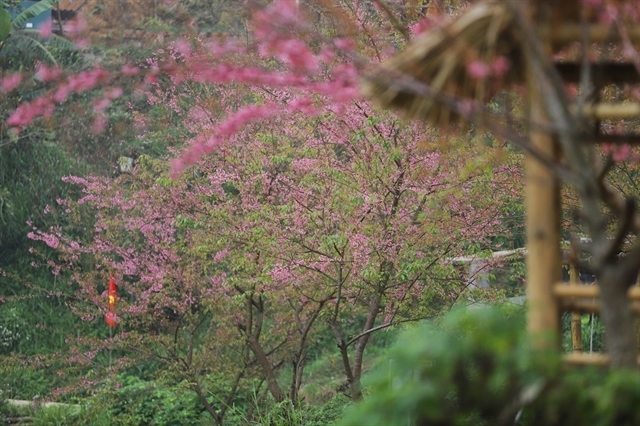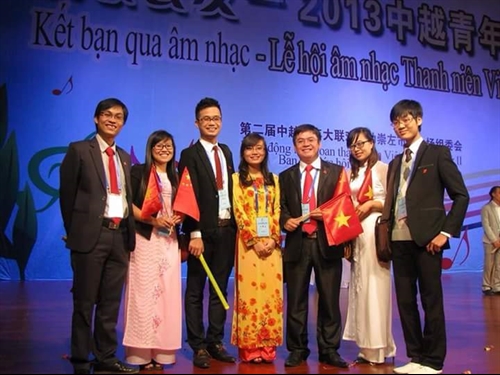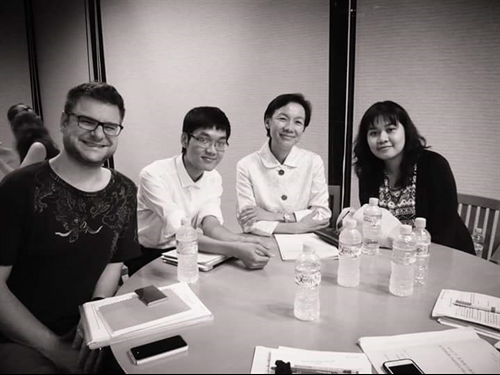 Features
Features

The oldest existing collection of Japanese poetry charmed Nguyễn Anh Tuấn, 24, that he made a research about it. The research received the Inoue Yasushi Award 2016, that honours foreign individuals who have performed outstanding research on Japanese literature.
 |
| Crossing borders: Nguyễn Anh Tuấn (first from right) and Vietnamese students in a cultural exchange programme between Việt Nam and Japan |
By Đỗ Minh
Viet Nam News - HÀ NỘI —The oldest existing collection of Japanese poetry charmed Nguyễn Anh Tuấn, 24, that he made a research about it. The research received the Inoue Yasushi Award 2016, that honours foreign individuals who have performed outstanding research on Japanese literature.
Travelling far away from home/ After my wife I yearn/ And nightly wish to dream/ Of her till I return (Manyoshu: A New and Complete Translation, Tokyo, 1967 by Heihachiro Honda)
This is the 3,142nd poem in Manyoshu (Collection of Ten Thousand Leaves), the oldest existing collection of Japanese poetry compiled sometime after AD759. It is widely regarded as being a particularly unique Japanese work.
The poem charmed Nguyễn Anh Tuấn, 24, the first time he heard it and inspired him to write a PhD thesis on the beauty of Japanese literature and language.
Tuấn graduated from the Oriental Studies Faculty, the University of Social Sciences and Humanities in 2014 with the highest scores. Due to his excellent results, he was encouraged to prepare his thesis.
A part of the thesis, a study on poetry of female authors in Manyoshu, his research was highly appreciated by both Vietnamese and Japanese experts. In fact, it was ranked top at the Inoue Yasushi Award 2016, the reward named after the great Japanese writer, to honour foreign individuals who have performed outstanding research on Japanese literature.
Once, in 2011, Tuấn listened to a song at a coffee shop. The singer started the song with the poem. The stories in the song and the poem are very similar. A young girl meets a man in Japan in spring. They fall in love, but the happiness doesn’t last long, as the girl has to return to her country when the winter comes. She sings the song to express how she misses her lover.
The love story and rhythm of the song vibrated in his heart and urged him to learn more about the haunting poem from the beginning. Tuấn was surprised when he discovered that the poem was written in the 8th century, being just one among 4,516 poems in the Manyoshu collection.
“It’s interesting to realise that there is no difference between people in modern and ancient times when they express their love to each other,” he noted.
“Despite the era they are living in, people have very similar ways to say how they love, miss and feel lovesick. I reject the viewpoint that people in the feudal era were more private, discreet or shy in expressing emotion than are people today.”
Tuấn nurtured a passion for Japanese culture in a very natural way, because he loved manga (Japanese comics) and anime (Japanese cartoons) when he was young.
“Many people may consider that manga and anime are nothing more than entertainment and they don’t have any educational value,” said Tuấn.
“Actually, Japanese authors transfer precisely the traditional culture and moral lessons into these cultural products. The gentle message gradually impacts the younger and they can learn about their tradition with enthusiasm.”
Since the age of eight, Tuấn expressed the interest in studying history. While his friends played games, he forgot himself in reading Đại Việt Sử Ký Toàn Thư (Complete Book of the Historical Records of Great Việt), the 15-volume book covered the period from Hồng Bàng Dynasty (2879BC) to the coronation of Lê Thái Tổ, the first emperor of the Lê Dynasty in 1428 that university students majoring in history can understand.
Though Tuấn was interested in the Manyoshu collection, his Chinese and English language only allowed him to have a basic understanding. He then decided to learn Japanese so he could dig deeper into the work’s value.
However, Tuấn faced considerable trouble when he tried to find references and documents relating to Manyoshu, because it is the oldest collection of Japanese poetry compiled during the Nara period.
In Việt Nam, there are only two documents about Manyoshu, written by researchers Phan Nhật Chiêu and Nguyễn Nam Trân.
“Half a loaf is better than no bread. Trân and Chiêu’s works provided me with precious materials to develop a general viewpoint about Manyoshu,” Tuấn said.
“I decided to narrow the subject, and just learn about female poets featured in the Manyoshu collection.”
As Tuấn searched for references, he had a chance to take part in the Summer Institute programme organised by the Japan Foundation for Cultural Exchange in Việt Nam, which allows young researchers to visit Japan for three weeks. During this time, Tuấn was absorbed in libraries to read about Manyoshu. He said he was delighted to study the book in the country where it was born.
“Tuấn received the top prize thanks to his deep and painstaking research on Japanese female authors’ poetry, which was written in an old language requiring much passion and effort to understand,” said researcher Chiêu.
“Tuấn accurately translated the poems, though he’s not a Japanese native speaker. However, he translated them in a literal sense. If he put more musical and poetic sense into the translation, the research would be perfect.”
The Inoue Yasushi Award encourages foreign researchers and promoted research on Japanese literature in foreign countries, in general, and in Việt Nam, in particular, thereby contributing to strengthening co-operation between the two countries.
Tuấn is passionately working on his research. He expects that in the near future he would release more essays about Japanese literature and contribute to the development of Japanese studies in Việt Nam and a mutual understanding between the two peoples.
There is much research on Japanese politics, economics and history, but very little on literature, according to Tuấn. “The Inoue Yasushi Award granted to Vietnamese researchers in the field of literature encouraged us greatly,” Tuấn said.
“Literature is a mirror reflecting the spiritual life, culture and people’s souls,” noted Tuấn.
“So, research in this field can enhance the mutual understanding and tighten friendship, especially when Việt Nam and Japan have many similarities in culture and a long-standing cultural exchange.”
“I’m a young researcher with very limited knowledge, so receiving the Inoue Yasushi Award is a great honour for me,” he added.
Someone asked Tuấn about his secret to study. Actually, there is no secret. He learns because he loves learning and wants to understand clearly what makes him confused.
“I study and research not for good marks nor titles, just because the work brings me joy and the beauty of scientific researching that I never know where I’ll end up,” he said. —VNS
 |
| New knowledge: Nguyễn Anh Tuấn (second from left) sits with other researchers at the Summer Institute, a programme organised by the Japan Foundation. It allows young researchers to visit Japan and learn about the country. VNS Photos |